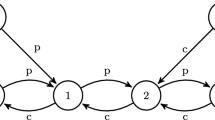Abstract
Infinite games are studied in a format where two players, called Player 1 and Player 2, generate a play by building up an ω-word as they choose letters in turn. A game is specified by the ω-language which contains the plays won by Player 2. We analyze ω-languages generated from certain classes \({\cal K}\) of regular languages of finite words (called *-languages), using natural transformations of *-languages into ω-languages. Winning strategies for infinite games can be represented again in terms of *-languages. Continuing work of Selivanov (2007) and Rabinovich et al. (2007), we analyze how these “strategy *-languages” are related to the original language class \({\cal K}\). In contrast to that work, we exhibit classes \({\cal K}\) where strategy representations strictly exceed \({\cal K}\).
Access this chapter
Tax calculation will be finalised at checkout
Purchases are for personal use only
Preview
Unable to display preview. Download preview PDF.
Similar content being viewed by others
References
Büchi, J.R., Landweber, L.H.: Solving sequential conditions by finite-state strategies. Transactions of the American Mathematical Society 138, 295–311 (1969)
Cohen, R.S., Brzozowski, J.A.: Dot-depth of star-free events. Journal of Computer and System Sciences 5, 1–16 (1971)
Grädel, E., Thomas, W., Wilke, T. (eds.): Automata, Logics, and Infinite Games. LNCS, vol. 2500. Springer, Heidelberg (2002)
Hopcroft, J.E., Motwani, R., Ullman, J.D.: Introduction to automata theory, languages, and computation, 2nd edn. Addison-Wesley series in computer science. Addison-Wesley-Longman (2001)
Perrin, D., Pin, J.-É.: Infinite Words. Elsevier, Amsterdam (2004)
Pin, J.-É.: Varieties of Formal Languages. In: North Oxford, London (1986)
Pin, J.-É.: Positive varieties and infinite words. In: Lucchesi, C.L., Moura, A.V. (eds.) LATIN 1998. LNCS, vol. 1380, pp. 76–87. Springer, Heidelberg (1998)
Rabinovich, A., Thomas, W.: Logical refinements of church’s problem. In: Duparc, J., Henzinger, T. (eds.) CSL 2007. LNCS, vol. 4646, pp. 69–83. Springer, Heidelberg (2007)
Selivanov, V.L.: Fine hierarchy of regular aperiodic ω-languages. In: Harju, T., Karhumäki, J., Lepistö, A. (eds.) DLT 2007. LNCS, vol. 4588, pp. 399–410. Springer, Heidelberg (2007)
Selivanov, V.L.: Fine hierarchy of regular aperiodic ω-languages. International Journal of Foundations of Computer Science 19(3), 649–675 (2008)
Simon, I.: Hierarchies of events with dot-depth one. PhD thesis, University of Waterloo (1972)
Simon, I.: Piecewise testable events. In: Brakhage, H. (ed.) Automata Theory and Formal Languages. LNCS, vol. 33, pp. 214–222. Springer, Heidelberg (1975)
Staiger, L., Wagner, K.W.: Automatentheoretische und automatenfreie Charakterisierungen topologischer Klassen regulärer Folgenmengen. Elektronische Informationsverarbeitung und Kybernetik 10(7), 379–392 (1974)
Stern, J.: Characterizations of some classes of regular events. Theoretical Computer Science 35, 17–42 (1985)
Straubing, H.: Finite Automata, Formal Logic, and Circuit Complexity. Birkhäuser Verlag, Basel (1994)
Thomas, W.: Classifying regular events in symbolic logic. Journal of Computer and System Sciences 25(3), 360–376 (1982)
Thomas, W.: Languages, automata, and logic. In: Rozenberg, G., Salomaa, A. (eds.) Handbook of Formal Languages, vol. 3, pp. 389–455. Springer, New York (1997)
Thomas, W.: Church’s problem and a tour through automata theory. In: Avron, A., Dershowitz, N., Rabinovich, A. (eds.) Pillars of Computer Science. LNCS, vol. 4800, pp. 635–655. Springer, Heidelberg (2008)
Author information
Authors and Affiliations
Editor information
Editors and Affiliations
Rights and permissions
Copyright information
© 2011 Springer-Verlag Berlin Heidelberg
About this paper
Cite this paper
Chaturvedi, N., Olschewski, J., Thomas, W. (2011). Languages vs. ω-Languages in Regular Infinite Games. In: Mauri, G., Leporati, A. (eds) Developments in Language Theory. DLT 2011. Lecture Notes in Computer Science, vol 6795. Springer, Berlin, Heidelberg. https://doi.org/10.1007/978-3-642-22321-1_16
Download citation
DOI: https://doi.org/10.1007/978-3-642-22321-1_16
Publisher Name: Springer, Berlin, Heidelberg
Print ISBN: 978-3-642-22320-4
Online ISBN: 978-3-642-22321-1
eBook Packages: Computer ScienceComputer Science (R0)




